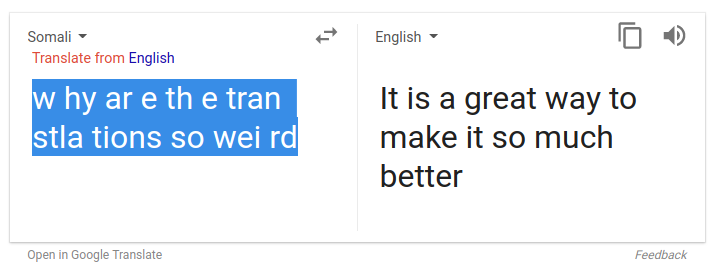Type the word “dog” into Google Translate 19 times, request that the nonsensical message be flipped from Maori into English, and out pops what appears to be a garbled religious prophecy.
“Doomsday Clock is three minutes at twelve,” it reads. “We are experiencing characters and a dramatic developments in the world, which indicate that we are increasingly approaching the end times and Jesus’ return.”
Videos by VICE
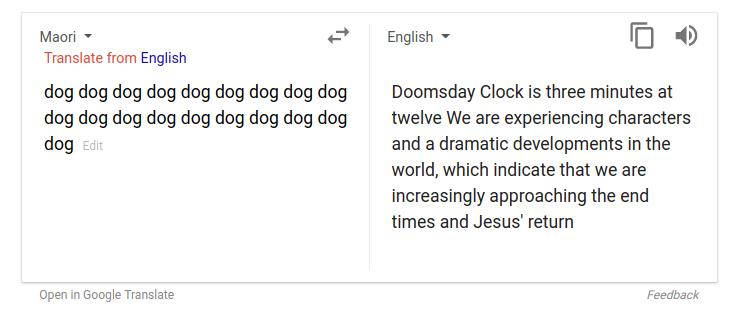
That’s just one of many bizarre and sometimes ominous translations that users on Reddit and elsewhere have dredged up from Google Translate, Google’s decade-old service that can now interpret messages in over 100 languages. In Somali, for instance, strings of the word “ag” translate into missives about the “sons of Gershon,” the “name of the LORD,” and references to Biblical terminology like “cubits” and Deuteronomy.
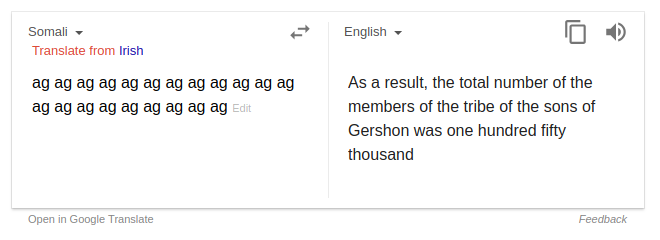
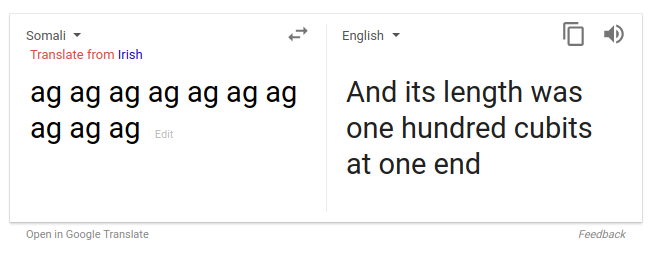
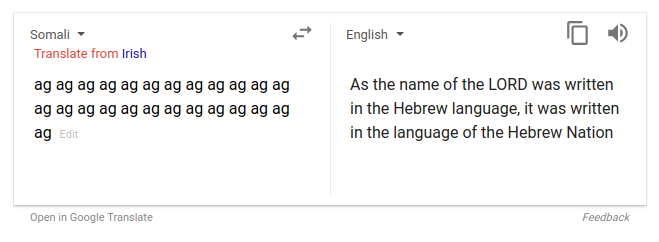
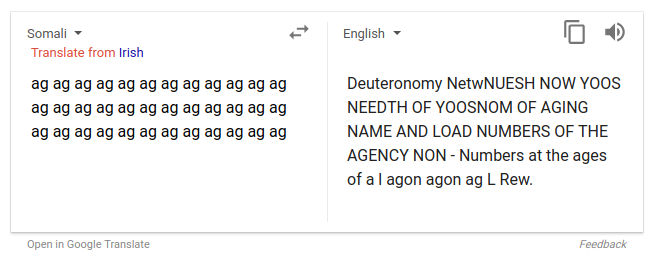
On Twitter, people have blamed the strange translations on ghosts and demons. Users on a subreddit called TranslateGate have speculated that some of the strange outputs might be drawn from text gathered from emails or private messages.
“Google Translate learns from examples of translations on the web and does not use ‘private messages’ to carry out translations, nor would the system even have access to that content,” said Justin Burr, a Google spokesperson, in an email. “This is simply a function of inputting nonsense into the system, to which nonsense is generated.”
When Motherboard provided Google with an example of the eerie messages, its translation disappeared from Google Translate.
There are several possible explanations for the strange outputs. It’s possible that the sinister messages are the result of disgruntled Google employees, for instance, or that mischievous users are abusing the “Suggest an edit” button, which accepts suggestions for better translations of a given text.
Alexander Rush, an assistant professor at Harvard who studies natural language processing and computer translation, said that internal quality filters would probably catch that type of manipulation, however. It’s more likely, Rush said, that the strange translations are related to a change Google Translate made several years ago, when it started using a technique known as “neural machine translation.”
In neural machine translation, the system is trained with large numbers of texts in one language and corresponding translations in another, to create a model for moving between the two. But when it’s fed nonsense inputs, Rush said, the system can “hallucinate” bizarre outputs—not unlike the way Google’s DeepDream identifies and accentuates patterns in images.
“The models are black-boxes, that are learned from as many training instances that you can find,” Rush said. “The vast majority of these will look like human language, and when you give it a new one it is trained to produce something, at all costs, that also looks like human language. However if you give it something very different, the best translation will be something still fluent, but not at all connected to the input.”
Sean Colbath, a senior scientist at BBN Technologies who works on machine translation, agreed that strange outputs are probably due to Google Translate’s algorithm looking for order in chaos. He also pointed out that the languages that generate the strangest results—Somali, Hawaiian and Maori—have smaller bodies of translated text than more widely spoken languages like English or Chinese. As a result, he said, it’s possible that Google used religious texts like the Bible, which has been translated into many languages, to train its model in those languages, resulting in the religious content.
“If they tried to build a model out of that stuff, it may be that the model simply throws a hail-mary pass (pun semi-intended) and barfs out a piece of its training,” said Colbath, who emphasized that he was speaking for himself rather than for his employer, in a chat.
Rush agreed that if Google is using the Bible to train its model, it could explain some of the strange outputs. Indeed, several of the bizarre translations in Somali resemble specific passages from the Old Testament. Exodus 27:18 references a hundred cubits, and several verses including Numbers 3:18 discuss the sons of Gershon.
Burr, the Google spokesperson, declined to say whether Google Translate’s training materials include religious texts.
Sometimes, though, it does feel as though the algorithm is channeling uncanny spiritual energies—or even cracking a joke.
After all, Google Translate interprets “w hy ar e th e tran stla tions so wei rd” in Somali, for instance, as “It is a great way to make it so much better.”
